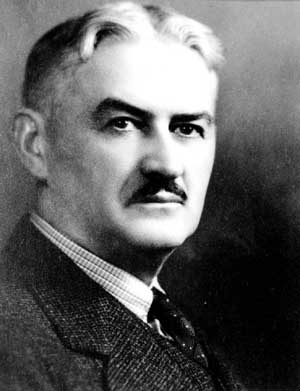On August 28, 1919, the Seattle City Council appoints Cecil B. Fitzgerald (1881-1971), a Republican, mayor of Seattle. He replaces Ole Hanson (1874-1940), who had achieved national fame during the Seattle General Strike six months earlier and now is more interested in pursuing higher office. Fitzgerald, who is three weeks short of his 38th birthday, is Seattle's youngest mayor up to that time.
A Well-Regarded City Councilman
Cecil B. Fitzgerald was born September 16, 1881, at Fitzgerald Station in Wisconsin, and moved to Seattle in 1894. His early career included stints as an accountant and in real estate. He was also interested in politics, and in 1914 he was elected to Seattle's city council. Given his accounting background, he served as chairman of the council's finance committee for most of the next five-and-a-half years. Well-regarded by many of his peers, he was not an unlikely candidate to replace Mayor Ole Hanson as Hanson began planning his resignation in August 1919.
Hanson had been elected mayor the preceding year and had made a name for himself during Seattle's failed general strike six months earlier. His strong stance in staring down what many perceived to be the opening salvo of a worker's revolution earned him praise nationwide. He took it to heart, touring the country, giving rousing speeches, and courting ideas for a possible presidential run in 1920. However, his term as mayor didn't expire until March 1920, and that presented a problem for him. If he took an extended leave of absence, his enemy W. D. Lane, president of the Seattle City Council, would become acting mayor, and Hanson wasn't about to let that happen. He explained it to the Seattle Star with typical Hanson flair: "Lane is a man whom I know full well is unfit for the office. I have no confidence in his citizenship or his patriotism ... I would as soon have taken a man from the penitentiary and left him in the mayor's chair" ("Fitzgerald Is to Be the New Executive").
To have more control over naming his successor Hanson had to work out a deal with the city council, which would make the choice, and then resign. By this time he had more than one enemy on the council, so the council chambers were rife with intrigue during the last week of August 1919 as Hanson worked to ensure that his choice would be appointed. Labor, still a potent force despite its setback in the strike earlier that year, argued for Lane, but he wasn't a serious contender. The wily Hanson removed him from the equation entirely by making sure he didn't get a vote when the council met on the afternoon of August 28, 1919, to vote on Hanson's resignation. After it was unanimously approved, Councilman James Carroll advised all that Lane was now unofficially the mayor of Seattle and ineligible to vote for Hanson's replacement. The remaining councilmembers then elected Cecil B. Fitzgerald mayor five votes to three over former corporate counsel (city attorney) Hugh Caldwell. The Seattle Times said the entire process took four minutes.
Seattle's Youngest Mayor
Just three weeks shy of his 38th birthday, Fitzgerald was Seattle's youngest mayor up to that time. (Wesley Uhlman [b. 1935] was 34 years old when he became Seattle's mayor in 1969.) During his six months in office he bore the brunt of attacks of those dissatisfied with the city's newly assumed ownership of its streetcar system, and he was no favorite of labor. Still, it was a surprise when he lost in the primary in February 1920, for reasons only vaguely explained in contemporary press accounts. (Fitzgerald himself later blamed it on having worn a silk topper hat when President Woodrow Wilson [1856-1924] visited Seattle the preceding September; even in those days, Seattleites didn't like their public officials putting on airs.) But he was gracious in defeat, urging voters to support Hugh Caldwell in the general mayoral election, which they did two weeks later.
Seattle voters returned Fitzgerald to the city council in 1921. He served for another three years, including as council president in 1923 and 1924. In 1923 he presciently founded an early bus line, the Washington Motor Coach Company, and owned it for nearly 25 years before selling it to Greyhound. He lived in the same house in Ballard (8023 32nd Avenue NW, near Golden Gardens Park) from 1918 until 1971, and remained active until the end of his life. He died in Ballard on July 20, 1971, when a car in which he was a passenger was struck by a speeding driver.

